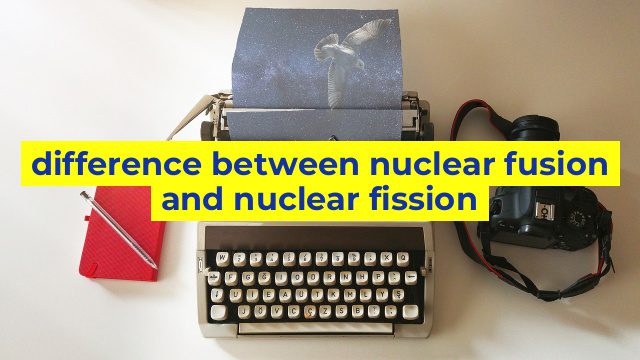The Difference Between Nuclear Fusion and Nuclear Fission
The world’s energy requirements are expected to double by 2050, requiring the implementation of alternative energy sources. Nuclear power, being one of them, relies on two fundamental nuclear reactions – fusion and fission.
Nuclear Fusion
Nuclear fusion is a process that involves the combination of atomic nuclei to form heavier elements. This reaction produces an enormous amount of energy and is the process that powers the sun. As a result, it has the potential to solve the world’s energy crisis since it produces four times more energy than fission. Another significant advantage of nuclear fusion is that the fuel source, hydrogen, is abundant, and no radioactive waste particles are produced during the process.
Scientists have been trying to replicate the fusion reaction on a smaller scale on Earth, but this has proven difficult. The process requires extreme temperature and pressure conditions, which are difficult to achieve for an extended period. This means that nuclear fusion is not yet commercially viable and may not be for some time.
Nuclear Fission
Nuclear fission is the process of splitting an atomic nucleus, releasing a large amount of energy in the process. The nuclear reactors currently used for energy production rely on nuclear fission. The process involves the bombardment of a small, unstable nucleus with a neutron, causing it to split, producing two smaller nuclei and additional neutrons. The additional neutrons released in the process then bombards other unstable nuclei in a chain reaction, continuously releasing energy.
However, the radioactive waste produced during fission, which if not adequately disposed of, could be dangerous for thousands of years. This makes nuclear fission non-renewable and unsustainable as a long-term energy source.
Conclusion
In conclusion, both nuclear fusion and nuclear fission are important reactions for generating energy, but they are fundamentally different. Nuclear fusion has the potential to solve the world’s energy crisis in a sustainable manner, while nuclear fission is a current, yet short-term solution with problems related to radioactive waste disposal. Although nuclear fusion is not yet viable, research efforts in this area need to be intensified to find a solution to the fuel crisis, avoid environmental damage, and secure sustainable growth for the future.
Table difference between nuclear fusion and nuclear fission
| Nuclear Fusion | Nuclear Fission | |
|---|---|---|
| Definition | A process in which two or more atomic nuclei come together to form a heavier nucleus, releasing a large amount of energy. | A process in which a heavy atomic nucleus splits into two or more smaller nuclei, releasing a large amount of energy. |
| Nature | A phenomenon that occurs naturally in stars, requires high temperatures and pressures to occur on Earth. | Occurs naturally in radioactive materials and can be controlled on Earth. |
| Products | Produces helium and releases energy. | Produces lighter elements and releases energy. |
| Energy released | Produces a much larger amount of energy compared to fission. | Produces a smaller amount of energy compared to fusion. |
| Applications | Potential source of virtually limitless energy, currently not yet commercially viable. | Nuclear power plants, nuclear weapons. |
